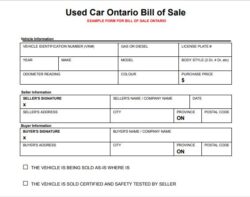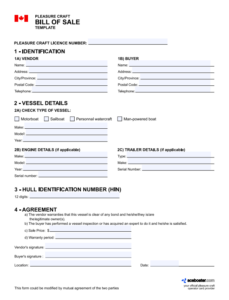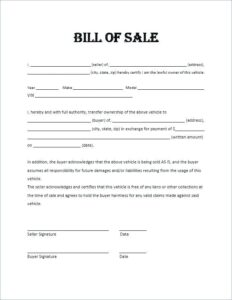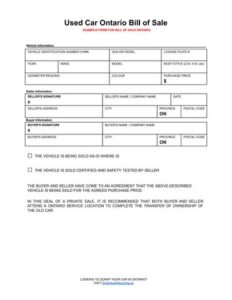Thinking about buying or selling a boat in Ontario? It’s an exciting time, whether you’re looking forward to new adventures on the water or passing on cherished memories to another enthusiast. However, beyond the thrill of the deal, there’s a crucial piece of paperwork that often gets overlooked: the bill of sale. This simple document is far more than just a receipt; it’s your legal cornerstone for a smooth and secure transaction.
Understanding the importance of a properly filled-out bill of sale can save you a lot of headaches down the line. It serves as official proof of ownership, protects both the buyer and the seller, and is often a prerequisite for various administrative tasks, like registering your new vessel or trailer. Let’s dive into why this document is so essential for any boat transaction in Ontario.
Understanding the Bill of Sale for Your Ontario Boat Purchase
A bill of sale is essentially a legal document that records the transfer of ownership of an item from one party to another. When it comes to something as significant as a boat, its role becomes even more critical. It’s not just a handshake agreement; it’s tangible evidence that a transaction took place, detailing exactly what was sold, for how much, and on what date. For boat sales specifically, this document becomes indispensable for establishing clear ownership, which is vital for insurance, future resale, and even for proving you own the vessel if it’s ever stolen.
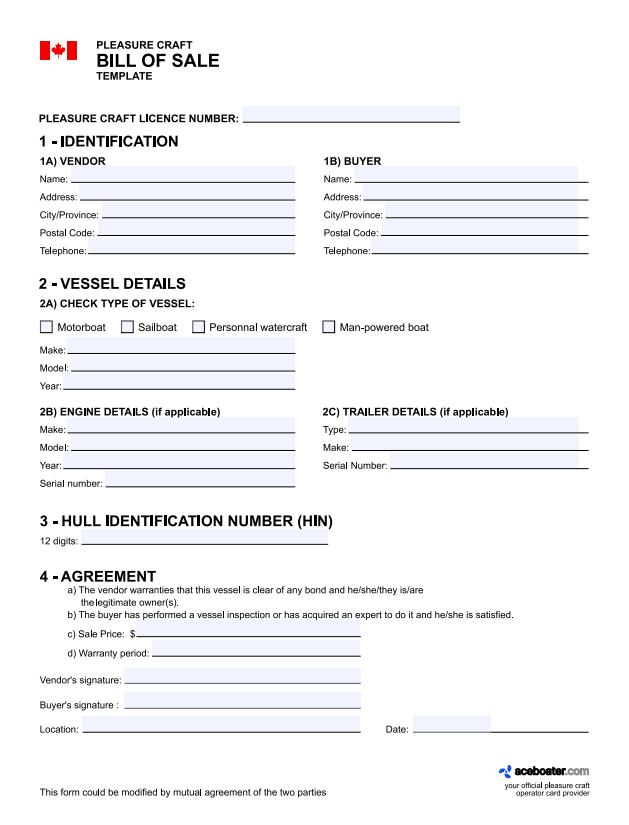
In Ontario, a clear bill of sale protects both the buyer and the seller. For the buyer, it’s indisputable proof that they are now the rightful owner, which is necessary for registering the boat (if required by Transport Canada) or its trailer (with the Ministry of Transportation Ontario – MTO). For the seller, it acts as a record of when they divested themselves of the boat, helping to mitigate any future liability associated with the vessel once it’s no longer in their possession. This clarity is particularly important in the context of private sales, where there isn’t a dealership to facilitate the paperwork.
Imagine selling your boat without proper documentation, only to find out months later that it was involved in an incident. Without a bill of sale, proving you no longer owned the vessel could be a complex and stressful ordeal. Conversely, as a buyer, having a legitimate bill of sale ensures you can confidently register your new acquisition and secure insurance, knowing you have a clean title and clear ownership history. It’s the foundation upon which all subsequent legal and administrative steps will be built.
Therefore, whether you’re buying a small fishing boat or a larger recreational vessel, ensuring you have a comprehensive bill of sale is a non-negotiable step. It simplifies the process, provides peace of mind, and safeguards your interests. A well-prepared bill of sale template for an Ontario boat covers all the essential elements, leaving no room for ambiguity.
Key Information to Include in Your Ontario Boat Bill of Sale
- Buyer and Seller Information: Full legal names, current addresses, and contact information (phone, email) for both the person selling the boat and the person buying it. This ensures both parties are clearly identified.
- Boat Details: Comprehensive description of the vessel, including make, model, year of manufacture, length, type of hull (e.g., fiberglass, aluminum), and the Hull Identification Number (HIN). If the boat is registered, include its official registration number. Also, specify if a motor or trailer is included in the sale, with their respective make, model, year, and serial numbers (VIN for trailers).
- Sale Price: The agreed-upon purchase price of the boat. It’s a good idea to write this out in words as well as numbers to prevent any misunderstanding.
- Date of Sale: The exact date the ownership transfer takes place. This is crucial for establishing when liability and ownership officially switch.
- Terms and Conditions: Any specific conditions of the sale, such as “as-is” where the buyer accepts the boat in its current condition with no implied warranties. If any warranties are provided, they should be clearly stated.
- Signatures: Both the buyer and the seller must sign and date the document. Having a witness (or even two) sign can add an extra layer of verification, though it’s not always legally required for a basic bill of sale.
Ensuring a Smooth Transaction with Your Boat Bill of Sale
Once you have your comprehensive bill of sale template for your Ontario boat transaction, the next step is to ensure it’s filled out accurately and completely. Take your time to double-check all the details mentioned above. Any discrepancies or missing information could lead to complications later, from issues with registration to potential disputes between parties. It’s often helpful for both the buyer and the seller to be present during the completion of the document to ensure mutual agreement on all points.
After the bill of sale is signed, both parties should retain a copy for their records. For the buyer, this document is critical for a few post-sale tasks. If the boat is large enough to require pleasure craft licensing, you’ll need the bill of sale to prove ownership to Transport Canada. Similarly, if a boat trailer was part of the sale, the bill of sale along with the previous owner’s vehicle information package (for transfers) will be necessary to register the trailer at ServiceOntario and obtain new plates in your name. Don’t underestimate its importance for insurance purposes either; insurers will often require proof of ownership before providing coverage.
For the seller, holding onto a copy of the signed bill of sale is equally important. It serves as your official record of having transferred ownership, effectively ending your liability for the vessel. This is particularly valuable should any issues arise after the sale, providing clear evidence that the boat is no longer your responsibility. It’s always a good practice to notify your insurance company about the sale as soon as it’s completed to ensure your coverage is updated or cancelled appropriately.
In essence, treating the bill of sale as a simple formality is a missed opportunity to secure your interests and streamline the entire process of buying or selling a boat. It’s the foundational document that supports every other step in the transition of boat ownership. Taking the time to prepare and execute it correctly provides invaluable peace of mind, allowing both buyer and seller to move forward confidently with their plans on the water.
Navigating the waters of boat ownership in Ontario, whether you’re acquiring a new vessel or passing one on, becomes significantly simpler and more secure when you prioritize proper documentation. A meticulously prepared bill of sale isn’t just a legal requirement; it’s a testament to a fair and transparent exchange. By understanding its purpose and ensuring all critical details are included, you’re not just closing a deal, you’re laying the groundwork for many enjoyable experiences on Ontario’s beautiful lakes and rivers.
